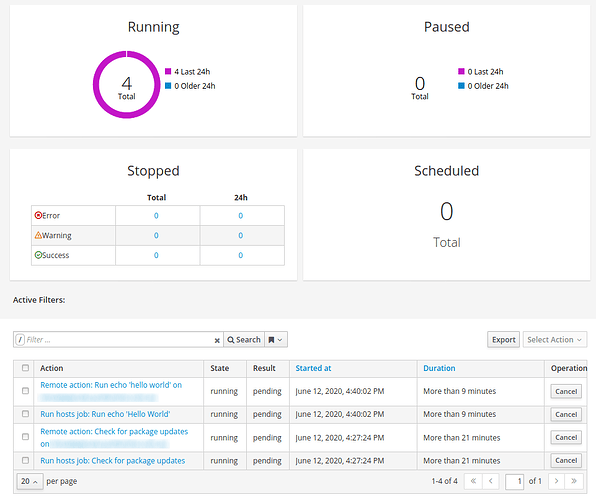As the saying goes: If it is not tested, it doesn’t work
and another saying goes: Testing can only show the presence of bugs, never there absence

Summary: Ansible (“Run all ansible roles”) fails on CentOS 8
After installing the ansible features as described above on both CentOS 7.8 and CentOS 8.2 VM previously mentioned in the posting, we have the following installed:
CentOS 7:
sudo yum list installed | grep ansible
ansible.noarch 2.9.9-1.el7 @epel
ansible-runner.noarch 1.4.6-1.el7 @ansible-runner
python2-ansible-runner.noarch 1.4.6-1.el7 @ansible-runner
python2-daemon.noarch 2.1.2-7.el7at @ansible-runner
python2-pexpect.noarch 4.6-1.el7at @ansible-runner
python2-ptyprocess.noarch 0.5.2-3.el7at @ansible-runner
tfm-rubygem-foreman_ansible.noarch 5.0.1-1.fm2_1.el7 @foreman-plugins
tfm-rubygem-foreman_ansible_core.noarch 3.0.3-1.fm2_1.el7 @foreman-plugins
tfm-rubygem-hammer_cli_foreman_ansible.noarch
tfm-rubygem-smart_proxy_ansible.noarch 3.0.1-5.fm2_1.el7 @foreman-plugins
CentOS 8:
sudo yum list installed | grep ansible
ansible.noarch 2.9.9-2.el8 @ansible
ansible-runner.noarch 1.4.6-1.el8 @ansible-runner
centos-release-ansible-29.noarch 1-2.el8 @extras
python3-ansible-runner.noarch 1.4.6-1.el8 @ansible-runner
python3-daemon.noarch 2.1.2-9.el8ar @ansible-runner
python3-lockfile.noarch 1:0.11.0-8.el8ar @ansible-runner
python3-pexpect.noarch 4.6-2.el8ar @ansible-runner
rubygem-foreman_ansible.noarch 5.1.1-1.fm2_1.el8 @foreman-plugins
rubygem-foreman_ansible_core.noarch 3.0.3-1.fm2_1.el8 @foreman-plugins
rubygem-hammer_cli_foreman_ansible.noarch 0.3.2-1.fm2_1.el8 @foreman-plugins
rubygem-smart_proxy_ansible.noarch 3.0.1-5.fm2_1.el8 @foreman-plugins
sshpass.x86_64 1.06-8.el8 @ansible
Unless stated otherwise, commands are being performed on both VMs.
sudo find /etc -name ansible.cfg
/etc/foreman-proxy/ansible.cfg
/etc/ansible/ansible.cfg
sudo egrep -v '^#' /etc/foreman-proxy/ansible.cfg
sudo egrep -v '^#' /etc/ansible/ansible.cfg | uniq
As section heading can only appear once in ansible.cfg, and there is no (actual) default configuration for ansible, lets just replace the package manager provided configuration, with the one foreman-installer generated.
sudo cp /etc/ansible/ansible.cfg /etc/ansible/ansible.cfg.orig
sudo cp /etc/foreman-proxy/ansible.cfg /etc/ansible/ansible.cfg
ls -l /etc/foreman-proxy/ansible.cfg /etc/ansible/ansible.cfg
# Verify command line ansible is functional
ansible -m ping localhost
localhost | SUCCESS => {
"changed": false,
"ping": "pong"
}
ansible -a 'cat /etc/redhat-release' localhost
localhost | CHANGED | rc=0 >>
CentOS 7: CentOS Linux release 7.8.2003 (Core)
CentOS 8: CentOS Linux release 8.2.2004 (Core)
I than selected the WebUI → Hosts → All Hosts → Select Action: Run all ansible roles
(which is running against the Foreman host itself)
This completed successfully after a few seconds on CentOS 7 but failed on CentOS 8.
Given I had not updated either system for a few days, I did a sudo yum upgrade on both systems. Only CentOS 7 had updates to apply and they are listed at the end of this posting. I followed this by a sudo foreman-maintain service restart on BOTH systems.
The test was repeated with the same results (CentOS 7: Success & CentOS 8: Failed). I further tested just remote execution, and it was functional, as can be seen in the following screen snap (from the CentOS 8 WebUI):
I reviewed the backtrace / stacktrace in each failure and they are the same (no differences at all), and it is attached here:
CentOS8-Run1.stacktrace.log (9.4 KB)
The following log files don’t add any value, that I can see:
/var/log/foreman-proxy/smart_proxy_dynflow_core.log
/var/log/foreman-proxy/proxy.log
/var/log/foreman/production.log
Regards,
Peter
The CentOS 7 packages updated
Package Arch Version Repository Size
=====================================================================================================================================================
Updating:
tfm-rubygem-foreman-tasks noarch 2.0.0-1.fm2_1.el7 foreman-plugins 2.2 M
tfm-rubygem-foreman_ansible noarch 5.1.1-1.fm2_1.el7 foreman-plugins 2.0 M
tfm-rubygem-foreman_remote_execution noarch 3.3.1-1.fm2_1.el7 foreman-plugins 1.6 M
Transaction Summary
=====================================================================================================================================================
Upgrade 3 Packages



